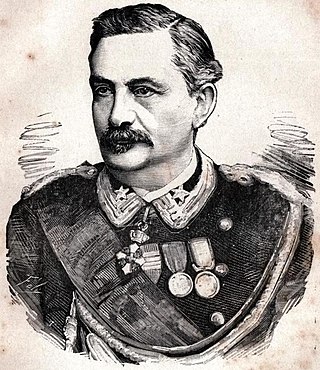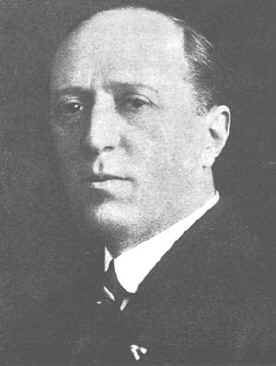The Silver Medal of Military Valor is an Italian medal for gallantry.

Ugo Cavallero was an Italian military commander before and during World War II. He was dismissed from his command due to his lacklustre performance, and was arrested upon the fall of Benito Mussolini's regime. Cavallero was later freed by the Germans, but refused to collaborate and was found dead the following day.

Cesare Francesco Ricotti Magnani was an Italian general who served as Minister of War of the Kingdom of Italy.
Authorized foreign decorations of the United States military are those military decorations which have been approved for wear by members of the United States armed forces but whose awarding authority is the government of a country other than the United States.

The Kuwait Liberation Medal is a medal created in 1994 that was issued by the government of Kuwait to both local and foreign military personnel who served in the Gulf War's "Liberation of Kuwait" campaign phase of 1990 and 31 August 1993.

Emilio De Bono was an Italian general, fascist activist, marshal, war criminal, and member of the Fascist Grand Council. De Bono fought in the Italo-Turkish War, the First World War and the Second Italo-Abyssinian War. He was one of the key figures behind Italy's anti-partisan policies in Libya, such as the use of poison gas and concentration camps, which resulted in the deaths of tens of thousands of civilians and have been described as genocidal.

The Order of Saints Maurice and Lazarus is a Roman Catholic dynastic order of knighthood bestowed by the royal House of Savoy. It is the second-oldest order of knighthood in the world, tracing its lineage to AD 1098, and it is one of the rare orders of knighthood recognized by papal bull, in this case by Pope Gregory XIII. In that bull, Pope Gregory XIII bestowed upon Emmanuel Philibert, Duke of Savoy and his Savoy successors, the right to confer this knighthood in perpetuity. The Grand Master is Prince Emanuele Filiberto of Savoy, Prince of Venice, also known as the Duke of Savoy, the grandson of the last King of Italy, Umberto II. However, Emanuele Filiberto's cousin twice removed Prince Aimone, Duke of Aosta claims to be grand master as his father claimed to be head of the house of Savoy.

Arturo Riccardi was an Italian admiral during the Second World War, serving as the Ministry of Marine Director General of Personnel from 1935 to 1940 and Under Secretary of State of the Navy from 1941 until 1943. A specialist of aerial warfare, Riccardi frequently worked with senior German naval officers on the defense of the Italian peninsula.

Inigo Campioni was an Italian naval officer during most of the first half of the 20th century. He served in four wars, and is best known as an admiral in the Italian Royal Navy during World War II. He was later executed by the Italian Social Republic for refusing to collaborate.

Ubaldo Soddu was an Italian general and politician who held the position of Deputy Chief of Staff of the Army and Undersecretary of State for War during the initial phases of World War II. On 13 June 1940, immediately after the outbreak of hostilities with France and the United Kingdom, he assumed the position of deputy chief of the General Staff. Promoted to army general, he replaced general Sebastiano Visconti Prasca as commander of the Albanian Higher Troop Command during the Greco-Italian War on 8 November 1940. Because of the defeat Italian troops suffered between 22 and 23 November 1940, he was replaced after four weeks in command by the Italian Royal Army's chief of staff, General Ugo Cavallero.

Sebastiano Visconti Prasca was an Italian general. A veteran of the Italo-Turkish War of 1911–1912 and World War I, he led the initial offensive of the Greco-Italian War in 1940 during World War II, but was relieved of his command after two weeks for incompetence and relieved by General Ubaldo Soddu.
The Medal of Military Valor is an Italian medal, originally established as a Sardinian award. It is awarded to military personnel, units above the level of company, and civilians for exceptional valor in the face of the enemy.
The Civil Order of Savoy was founded as an order of knighthood in 1831 by the King of Sardinia, Charles Albert, Duke of Savoy. It is now replaced by the Order of Merit of Savoy.The intention was to reward those virtues not belonging to the existing Military Order of Savoy, founded by Vittorio Emanuele I in 1815. The order has one degree, that of Knight, and is limited to 70 members. Admission is in the personal gift of the head of the House of Savoy.

The Military Order of Savoy was a military honorary order of the Kingdom of Sardinia first, and of the Kingdom of Italy later. Following the abolition of the Italian monarchy, the order became the Military Order of Italy.

The Italian honours system is a means to reward achievements or service to the Italian Republic, formerly the Kingdom of Italy, including the Italian Social Republic.
The Decoration Honor of Naval Merit Commander Peter Campbell is an Uruguayan military decoration awarded by the President of Uruguay to civilians, military officers, military units or to institutions, Uruguayan or foreign, as a recognition of the relevant services or works performed to the Uruguayan Navy. This decoration was named after Peter Campbell, an Irish naval officer who became the first commander of the Naval forces created by José Artigas.

Alessandro Asinari di San Marzano (1830–1906) was an Italian politician, general, and Senator of the Kingdom of Italy

Carlo Petitti di Roreto (1862-1933) was an Italian general who was most notable during his service in the Italo-Turkish War and World War I.

Guido Biscaretti di Ruffia was an Italian admiral and politician.

Francesco Della Valle was an Italian physician and general who served as General Director of Military Health from 1920 to 1925.















